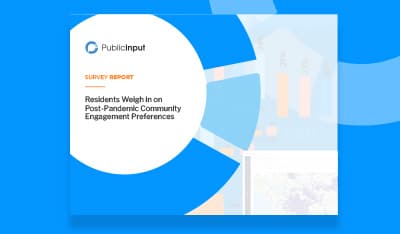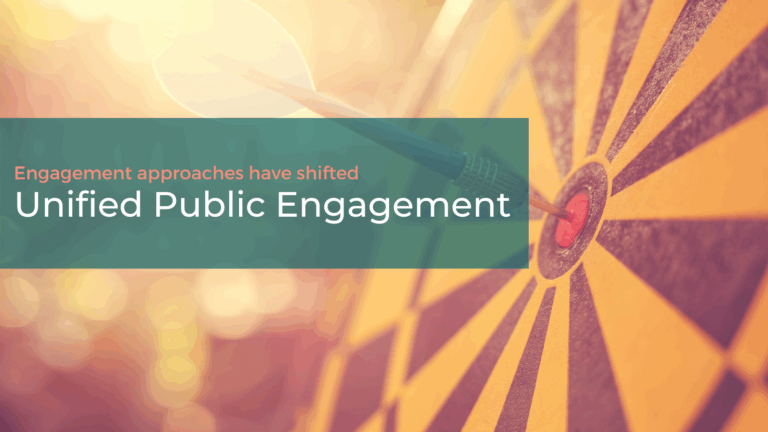PublicInput Survey Shows Residents Prefer More Direct Community Engagement

Post Pandemic Insights Validate Resident Preferences
Anyone in or out of local government who has participated in any public deliberations has seen dramatic changes in how their governing bodies have conducted their public proceedings and information management.
In March 2020, the pandemic forced local governments to make radical changes to how they conduct their public deliberations and engage their residents while complying with state open government laws. Today, most local jurisdictions, if not all, have returned to in-person meetings, and many governments have continued to offer online or hybrid options to their conventional community engagement practices.
Here at PublicInput, we wanted to study this new era of government-resident collaboration. We have seen the changes and impact on our customers across the nation and on their agencies and institutions. We wanted to learn more about how the public has responded to these changes.
That’s why we hired a private survey company to conduct a national survey that could provide data that measured and revealed the public’s preferences for community engagement with their local government. The survey was conducted in May and June 2022 and reflected responses from more than 1,000 residents across the U.S., as well as racial demographics represented in the 2020 U.S. Census.
The survey covers the government-citizen and citizen-government collaborative process before, during, and following a public engagement initiative. The findings provide insightful information about the implications of the pandemic on government engagement in our digital society.
While most governing bodies have adopted online or digital methods for public engagement and participation, residents are signaling they have developed their own expectations for how they want to be contacted by the local government and how they prefer to collaborate with them through their input and feedback.
Key results from the survey include:
- A large majority (71%) of respondents reported they are not being “asked” by government for their input or feedback.
- When it comes to receiving notifications from local government, most residents prefer electronic methods about opportunities to participate –namely, via email (55%).
- Residents want to be more informed before and after contributing their input or feedback to their local government.
- Seventy percent (70%) of respondents stated they were comfortable joining virtual public meetings.
- While nearly 18% of respondents said they do not provide input to their local government when asked, nearly half (48%) of this group said they lack the information to contribute an informed response.
Considering the survey findings, we have developed a list of recommendations for local governments to consider and/or incorporate into their public communication and information-sharing practices that could increase knowledge and participation and improve public trust. These include:
- Update your engagement approaches to match resident expectations. Local governments must utilize more direct outreach tools to connect with and engage residents by meeting their personal preferences for communication and information sharing.
- Local governments need to do a better job closing the loop; that is, informing residents about how their responses are used. Many residents report they do not hear from their public officials after their solicited input is received.
- Ensure residents have the information they need to provide informed input. The importance of communication and strategic outreach planning that prioritizes the critical need for information sharing will set the context for residents, making it possible for them to effectively contribute.
- Local governments should increase their online deliberations for residents to provide public comments as nearly 40% reported they were comfortable speaking in a virtual meeting.
For local governments seeking to improve the effectiveness of their engagement process, understanding the interplay between why a person may or may not engage as well as how they engage has the power to dramatically impact engagement outcomes.
We are excited to confirm that new digital government outreach methods can meet resident engagement preferences and practices and emphasize the importance that governments should continue to support residents’ preferences while seeking solutions to unify and centralize digital and conventional engagement methods. That’s where technology is crucial. The point of software like PublicInput is to help teams do more with less, exceeding resident expectations while reducing staff workloads.
To learn more about resident preferences and best practices in doing so, download the full survey report.






